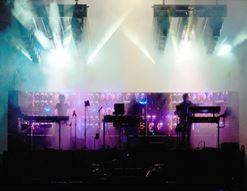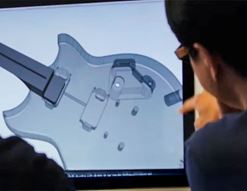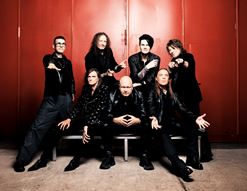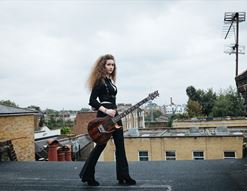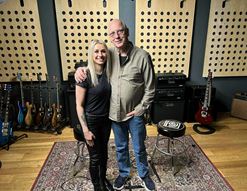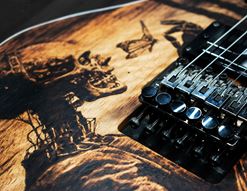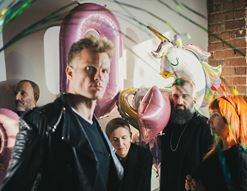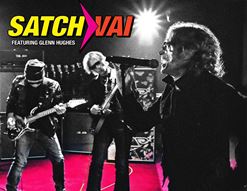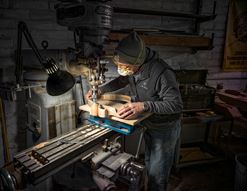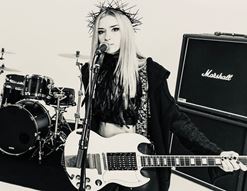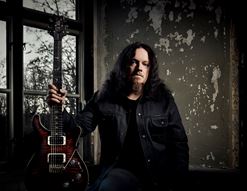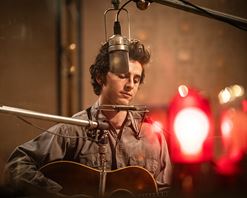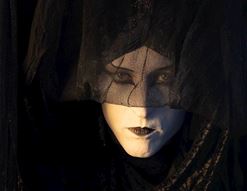It’s a sunny day outside Nashville when we connect via Zoom with Amanda Shires to talk about her new record, Take it Like a Man. Sitting on a veranda with rolling green fields and trees behind her, birds chirping away in the middle distance, it’s an idyllic setting indeed. It’s actually quite a contrast to the relatively dark, slightly noir-ish feel her new music has but the more we talk to this gifted and charismatic artist, the more we understand that both contrasts are very much part of the same individual.
Known worldwide for her solo records, her virtuosic violin playing and her breathtaking harmonies, Amanda Shires is one of the most recognisable people in contemporary country music. Along with her superstar husband Jason Isbell, Shires has created a fascinating body or work, both solo and collaborative. One such collaboration is The Highwoman, which we’ll speak about towards the end of this exclusive interview, but before then, we have plenty to talk about.
We found Amanda to be in great form during our conversation: light-hearted, witty and very eloquent, with an easy charm and lots of interesting wisdom to pass on. No question was an issue, and no subject was dodged as we navigated all kinds of conversational topics. From how she writes lyrics (one of the coolest methods we’ve yet heard in over a hundred and fifty guitarguitar interviews), to how she constructs vocal harmonies, right through into the nitty-gritty of married life, Amanda didn’t hold back, nor did she disappoint!
In this hour long conversation - which is only edited slightly for brevity below - you’ll hear what it’s like to record in Elvis Presley’s own favourite studio, you’ll hear about the People’s Keys in music and you may even hear a tiny little bit of guitar chat from Jason towards the end! Here then, is one of the most interesting and in-depth interviews we’re done yet.
Amanda Shires Interview
guitarguitar: So, yeah, we’re gonna talk about your new record - Take it Like a Man - the writing, the singing, the process, all that good stuff. We haven’t spoken before so this is a nice opportunity to learn stuff!
Amanda Shires: Well, this is exciting for me because I haven’t talked to anybody yet about the record! (laughs) I’m serious: you’re the first person!
GG: Wow, cool! So this’ll either mean I get all the exlsuives, or I’m just a warmup for later, right?
AS: I wonder what it’ll be like, if we can have them reschedule for like a year and ask the same questions and see if the same answers happen! (laughs)
GG: Totally! So, how have the past two years been for you as an artist, with all the pandemic and everything?
AS: Well, in hindsight when I look back on it, in my mind it was like we were living in the same spot forever, like everybody else. But also, in my mind, it feels like it was - I don’t know why time is like this - but in my own brain, it feels like when you play out that time, it’s like reliving the same three or four days. But I know in actuality, it was years for us. It’s odd to me that it should feel so much shorter now than it did going through it all. It’s strange. So yeah, I dunno, I just did like everybody else: I tried to keep myself busy, try to do something with the time and then…here we are.

(Photo: Michael Schmelling)
GG: Yeah! Well, I suppose one of the things you did was this record. Am I right in saying it was both written and recorded during the latter stages of the pandemic, yeah?
AS: It was, yeah. We had to do covid tests and masks, all that stuff. We recorded at RCA B in Nashville, where Elvis recorded. That’s usually a studio that’s reserved for only tourists to go through and tour because it’s historic. Even the lights remain the same as how Elvis had them set up, the blue lights he’d flip on for when it was a slow song and a red one for a fast song.
GG: No way! I didn’t realise that, that’s amazing! So, presumably the songs were already written by the time you got to the studio, but did being in there influence the performances or the sounds?
AS: Definitely. There’s no other room that I’ve ever went into in any kind of recording studio that has that sound. If you look up records recorded in that room and played them, then A/B’d them with records from another studio you like, they all have their own sounds. It’s like, everybody has to be in the same room, even the drums. You have to sort of manipulate the room with these rolling walls to make it isolate somewhat. And the power is crazy! You can hear the power, the buzz I guess. It’s something Jason fought a lot with and then finally moved to a Gretsch guitar because that one wasn’t doing the thing (more on this later on - Ray) and then we decided that was why Chet Atkins used all the Gretsch guitars in that room.
GG: I see! I read a little bit about that in the press release and wasn’t sure what to make of it. Is it because they are a little less powerful sounding than some guitars? They’re putting out less of a fight to the room acoustics?
AS: I honestly need to find out the reason for that, because to us it was like, ‘Is there ghost in the walls?’ Is it in the electricity? What has the Gretsch got that could tone that down? If he pops through here, I’ll ask him.
GG: Sure! Now, it’s really interesting that you mention ghosts in the electricity, because one of the first things I thought of when I listened to your record is that, compared to your other work, this one is almost more noir-like, like a sort of David Lynch situation. And of course, ghosts in electricity is a very Twin Peaks thing! Am I on the right track with what you were going for?
AS: Yeah! You were. My friend Lawrence Rothman, I don’t know if it’s because we are two months apart in age difference or if it’s because we both started being professional musicians in 1994 or 6, both separately in two very different areas of the country, but we have similar cultural references and music references when we’re trying to get sounds, and describe what we want to hear, along with the fact that they’re current with all the new ways to record. There are these digital tools that you can use that are really necessary if you’re trying to communicate a certain sonic landscape.
Anyway, I think together, it’s kinda like I found a person that I could write me songs and explain them to, and that they would be able to translate that into as close to exact as I can hear it in my mind. I know that sounds crazy but it’s true. Maybe we’re not reading each other’s minds, but maybe it's like uh…I really think we could’ve been like brother and sister.
So, that was the gift there. You can’t tell on my past records that I’m as dark as I am but I am, and I mean, most of us sad clowns are. (laughs)
GG: That’s true, and you also mentioned with Lawrence, about you two writing a song together via text message? How does that happen?
AS: One of the only gifts I got from covid was that! You know, I wasn’t in the best spot with music after covid, and the recording projects before that. I thought that I was just gonna record with Jason for some stuff as it came in and was gonna become a painter or maybe a farmer (laughs). Or maybe an undertaker, whatever kept us in groceries. I guess the stars weren’t done with me or wherever but the song Larence had written, they sent to me and I really liked the arrangement. I decided to record on it and then, when I called Lawrence to ask how they liked it, they were like, ‘you need to take all that altar boy off of it!’ I was like, okay but let me talk about how you're gonna treat this vocal because I don’t want you putting me on there sounding like Minnie Mouse! Then we were texting back and forth and it was never surface, it was straight into actual human feelings and emotions. Within a day or two we were talking about some deeply personal shit regarding their life and childhood. It became a song over text because at that time, we hadn’t really installed the internet out here in the country. We tried everything but text was kinda the only way we could do it: we couldn’t hold a Zoom for very long. Now we can! Took a lot of doing!
GG: So are you quite far outside of Nashville, then?
AS: Oh yeah, we live in the country where we can have chickens, birds, you know?
GG: Yeah. One of the things that I really enjoyed reading about in the press release was about your journaling, and the index cards…
AS: So the way I write songs, the way it works for me is I take notes and I do some sort of writing every day, even if it’s just five minutes of holding a pen. Those notes go into a German-made journal that I use, I can’t pronounce it and no I’m not gonna try! (laughs) They fill up and then I just don’t feel like writing, it takes a coupla weeks to realise it. Then I go through the journals and I highlight the words and phrases or themes that keep repeating. Sometimes similar couplets, sometimes general images. Then I put each image or phrase - sometimes there’s a line or two intact, sometimes there’s a whole verse intact - I give each one an individual index card. Then, in black sharpie, I put them in print. That way, my own handwriting doesn’t affect my thinking.
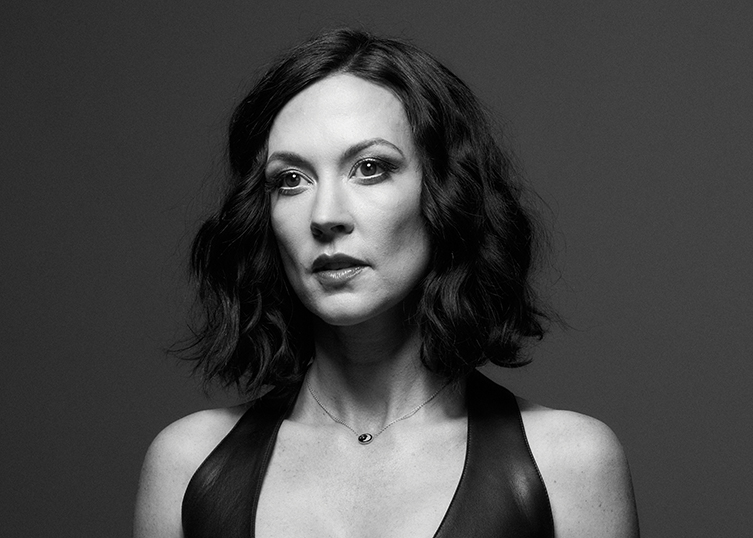
(Photo: Michael Schmelling)
Then I get blue painter’s tape and I start taping them on the walls. I start writing songs and playing chords, and somewhere in all of the confluence, all of the synthesising, it sort of becomes a thing, a song. Also, you can move the cards around and start seeing themes of what I’m trying to learn for myself in this life. They start appearing together, working kind of like its own sorting but there’s really no sorting. Also, if you get stuck, they’re just hanging out over there and they can become songs.
Those journals that I wrote in, I shred them in my shredder and then I put those pieces of paper in the composter, and then I give the compost to my tomatoes in the hopes that one day, the tomato skin will have words on it. (laughs)
I have a bit of a fear of being misinterpreted, and what I write in my journals is not always confessionals, sometimes it’s just writing exercises I find on poetry websites or from my old poetry classes. Sometimes I get afraid if some day I was to die, not that I’m Andy Warhol or Marilyn Monrow or Kurt Cobain-interesting, but those people’s journals are all published: somebody’s making money off of ‘em! It seems like ‘I don’t know how to feel about that’, but with my own, I wouldn’t want people to read what’s in my journals, because, yes, I’ve researched some crazy things for continuity when it comes to dealing with subject matter. Like in this Highwomen song, I didn’t have the girl getting burned because at that time, they were being hung. I had to look up how women were being killed at that time so I didn’t mess the song up (laughs), but there were notes about that, you know? One day, looking back, I’d hate for my daughter to read that and think, ‘Woah, my mum was really thinking of some crazy shit!’ (laughs) So, to protect myself and others, I shred ‘em. And also, it’s kinda like, who needs all that/ It’s a fire hazard, that’s a lotta pieces of paper! (laughs)
GG: That’s really interesting! So does that mean that, on any given song, you could have bits of lyrics from yesterday, and bits from two years ago? Or last month?
AS: Not two years ago. I usually…well, actually, you’re right, because there are some of those index cards that still exist that I can’t let go of. When I don’t use them, I stack ‘em back up in a little box. I have probably 18 boxes of them but they do come in handy when you’re doing other projects. I pulled from them to do Highwomen, and to do some of my Christmas project, it helps get your brain going but also, there are some songwriters that I’ve met along the way that say that you carry some of your songs around for 8 or 9 years, maybe longer, until you get the experience that finishes the idea. So, I do that, but also I have some friends that will come over and just take a couple of them off the wall (laughs), I have that plenty! Cuz really, what are you really gonna do with it?
GG: Haha, sure! I like that! Now, obviously I associate you mainly with vocals and violin playing, but what do you actually write your songs on?
AS: Sometimes I write them on violin, a lot of times I do them on tenor guitar or ukulele. Okay, my choice instruments to write on are: the autoharp, which is fun, and I like the way that it takes like 45 minutes to tune it first (laughs), and I like it because you don’t have to think too hard, you just push some buttons. Yeah, I like tenor guitar and ukulele.

(Photo: Michael Schmelling)
With Lawrence, it’s the first time I’ve tried writing to a track. So, I wrote 27 songs for this record and they didn’t all make it but along the way, Lawrence had this big folder of tracks that they said, ‘Hey, if you wanna just listen to these and see if you write a gond to them, that’s cool’, and so I did that. It was really fun, and different: I’d never tried that and I think I still really like it. I don’t like to write on full-on guitar any more, but that’s probably because we have a guitar player in the house already (laughs).
So that song, Bad Behaviour, that was a track that Lawrence had come up with the music to and recorded already, but not the track as it exists now.
GG: I see. Now, there are a couple of things you touched on there. Am I right in saying that the violin is your first instrument? Like, your primary one?
AS: It’s my main instrument. It’s the one I’m the most proficient on and the most comfortable.
GG: So, do you find when you’re writing songs that the violin influences things like keys and chords, just due to the nature of what you have available on the violin?
AS: Yeah, I mean, definitely. I do think that the violin is way more complicated than a lot of people understand and it is a melody instrument, so it’s melody first. I think that playing the violin influences every part of me, every expression of mine, because it was my first language, before I learned to speak completely as an adult human. That’s why I gravitated to it: something about music spoke for me and helped me feel like I was talking. I think it even influences the way my voice sounds. Being that close to an instrument and hearing how it reverberates and sustains or doesn’t, I think a lot of it is tangled up together.
It definitely influences the chord choices, because for me, if I’m gonna play it on violin, it needs to be within the range of what the instrument can do. The violin’s tuned in fifths and the guitar’s tuned in, what are they?
GG: Fourths.
AS: So, it affects chord choices for sure. I don’t write a lot in E; I don’t play the guitar, and E on the fiddle is not the best way to showcase that either. It’s also not the people’s key: violin’s way older so it speaks to people on a deeper level, but that could be the fact that I’m biased and I really believe what I’m saying! (laughs)
GG: Hey, I love that idea of the people’s key! For context, I play the cello and so C and D are the keys I feel most comfortable in…
AS: Those are the people’s keys!
GG: Oh, cool! Hahaha!
AS: Exactly! Yeah, and it’s songs that are old, old, old. Let’s disregard the fact that everybody’s fighting about 440 or whatever (Amanda is referring to ideas about modern music having been ‘tricked’ out of its natural ‘A’ frequency being 432Hz in favour of today’s concert pitch of ‘A’ as 440Hz - Ray), these songs in these people’s keys…at this point, we’ve inherited them somewhere in our genetics and we respond to them in different ways than we do with sort of modern versions.
I mean, I fuckin’ love the guitar. I can get down with some Van Halen, I can kick with the best of them but there’s definitely some stuff that moves you when you hear it…and I’m not trying to antiquate my own music, I’m just trying to say that there’s something older than us all - like, even language - that’s in music, and it is in these keys that are what we play in on violin and cello.
GG: Yeah, I’m entirely with you, I know exactly what you mean. I wonder if I can dovetail that into your singing. You’ve got this stunning voice and it’s the harmonies I’m really interested in. I know you’re obviously schooled in the violin, so I wondered: when you create your harmonies, is that something that’s built up in a kind of pre-mapped out way? Or is it more off the cuff, as you go along?
AS: I learned that stuff playing Western Swing and Hot Jazz. My first professional band was the Texas Playboys who were a country music band who had harmonies and they had fiddles and women songwriters. I learned from playing really old music and playing with people who played in multiple part harmonies, who sung that way in choruses. Even so much so where we would sing and do the chromatic walk ups and, you know, descend and all of that while playing. I started at such a young age, like 14. Before professionally, I was practising a lot to get to where I could do that stuff but I think it becomes part of you. Like, it’s part of your ear now, and it’s part of the way you understand music. It goes past what you’ve learned with your muscles into what you know is right: like, you somehow instinctively know when a thing is right.
But, what I will say is that the highest compliment I ever got was one time Emmylou Harris had me sing harmonies for her and I made her right it down because I told her no one would believe me, but she said that I was her favourite harmony singer.
GG: Yeah! That’s incredible!
AS: I’m ready to jump off this boat and die now!
GG: That’s such high praise. So, just because I’m interested, do you kind of visualise the harmony, like a certain point above the original melody? Is it like that?
AS: Like you mean matching a 3rd or a 5th?
GG: Well yeah, but they’re not always gonna be a 3rd or a 5th, are they?
AS: Yeah.
GG: So it’s like that imaginary jaggy line that zig-zags up and down through the melody. I wondered if it was just a matter of practice for you?
AS: I think there’s a couple of things working. First, I like to pay attention to what mode we’re in and a lot of times we’re in the same old modes. Then I like to differentiate between what’s the verse doing and what’s the chorus doing. At all times, we wanna make sure that the chorus opens up, unless someone tells me not to. It can do that in a number of ways, and I’m trying a basic example here: if I’m singing with another person, like a male, I’ll generally do a blend of the 3rd and the 5th, depending on where they are in the scale and what my range is. I like it to lift but I also never like to hit the last note of a phrase. I like to never do that. I like to never be the last voice heard. I like to dovetail out: that way, there’s still always a lead part. You run the risk sometimes that the singer can run out of breath, even.
I pay attention because it's not about the singer, it’s not about me and it’s not about anybody else, it’s about all of us trying to make music the best way we can, together. You know, a lot of times, singers will forget that and they’ll go ‘It’s my name on the sign!’ Well, that may be true but do you wanna be awesome or do you wanna be mediocre? (laughs) I just try to do my best and I like to serve the songs. If the song sounds like a sad song, even if it’s a happy song I’m gonna defer to that tone and that landscape, just because if it’s meant to be like a happy song disguised as a sad song, I don’t wanna ruin the joke! I’m just gonna go with what the intention was until somebody tells me something different.
I also don’t sing lines that don’t make sense in the character. Like, if it’s one person talking in a song, I’m not gonna sing on the line that’s supposed to be one person, cuz then it makes the song sound ridiculous.
GG: Oh wow! I never even thought of that!
AS: Yeah! For the most part, I never sing a statement that has an ‘I’ anything, because then you’re messing up the whole song, I think, because there’s only one ‘I’, which one is it? Haha!
GG: Yeah! That’s a good point. So, you were saying there about that whole ‘I’m the singer’ thing. Well, on this occasion, you are the singer! This is your record. I have one question that relates to your husband Jason, because he plays guitar on the songs. I wondered: in that context, that of your songs and your vision, is there a process of direction involved in working with him? ‘That’s a bit flash, Jason, bring it down a bit’, that kind of thing?
AS: Well, first, if there’s anyone who wants to learn anything with this, I’ll say firstly: don’t work with people that are assholes. (laughs) And second; you wanna work with people whose main goal in music is to serve the songs and connect with people. If their main goal is money or fame, don’t work with those people, because that’s not gonna be a happy life and you’ll wind up in scenarios where people don’t listen to you. So, with me and Jason, down to the first hearings of songs when we decide to play songs for each other or share the work, we’re never in a competitive state. It's never like, ‘I secretly hate that’. We don’t ever say ‘I love that song’ when it's a piece of trash because we’re not gonna lie about it! When it comes to studio time, you also wanna pick people that know more about their own instrument than you do. That can be tricky for people sometimes: a singer might come in and say ‘I really want the fiddle to do x,y and z’ and I’m like, that’s kinda physically impossible, and also, F# is not a key that I enjoy so I’m not gonna do that. If you want to change the key, we can do whatever you want! Also, I’ll play in F# if I really like the song (laughs).

(Photo: Michael Schmelling)
When I get in the studio - and when Jason does too - we have people we work with that know their instruments and also don’t have an ego about it. It’s almost democratic but not quite because there’s always one person that can veto your idea. For us, it’s like, we play and record our ideas and do that a couple of times, because in the studio you don’t know the song at all. You’re all learning it together. It’s a bad idea to start shutting ideas down at the top, to squish everything, because then where do you go? You have to start directing people on instruments you’re not qualified to talk about. I have no business telling the drummer what drums to play, unless I want to hear something different. I feel like that’s kinda disrespectful, especially if you hired the person and picked them out, you should trust them some.
So, if something does get too flashy - and it rarely does because I’m lucky enough to play with people who listen to words - but sometimes though, like in this studio experience of RCA B, I asked Jason to play the ukulele so I could play the violin. Oh boy, do I have a picture of that (laughs). We had to put up all these sleeping bags and mattresses, all these sound baffles because that room is like the size of a living room. He was so mad about it that he even put his hoodie up because he didn’t even want a picture of him having to play it! He was like, ‘I’ve got all these guitars and amps and you want me to play the ukulele!’ Well, you can, can’t you? He was so mad (laughs). That song is still really good but it didn’t make the record. And it’s not because of his playing!
GG: Maybe that’s one for the deluxe box set, right?
AS: Yeah!
GG: Now, Amanda, that was one thing that I meant to dovetail back on earlier: you mentioned about your poetry and how you went to school for it a few years ago. Am I right in saying you earned a Master’s in Poetry?
AS: Yeah, that’s something I’m really proud of, just separately from music, you know? That wasn’t an easy undertaking but I got through it. They made me read everything Ulysees ever wrote! And try to understand some of it, which is incomprehensible! (laughs)
GG: I know that poetry isn’t lyrics and lyrics aren’t poetry because they were designed for different reasons, but does that love for words and for rhymes and poetry have a bearing on how you write lyrics?
AS: I’m so glad you said that, because they are two different animals and a lot of people get it confused. A lot of songwriters will put out a book of poetry and I’ll be like, ‘What the fuck is that?’ (laughs) Kindlin’, I call it. Kindlin’. It’s the love of words, really. For me, back to this fear of misinterpretation that we’re now discussing in our therapy session, there’s more to it than even that. Knowing how important words are when trying to communicate. Like, even if you’re trying to say something nice and you pick the wrong word, it comes off like you’re an asshole. Or saying cliches can make people feel like you don’t care, you’re just saying some jargon. But I do know that’s not always true, because some people just have a limited vocabulary.
For me, the feelings in human emotions are so complicated and so shaded or coloured that I'm always trying to find the way to say my feelings that represents them the closest, usually with some kind of image. I’m trying to be as accurate as possible, and I’m still trying to be that. Yeah, so I think the degree in poetry helped me a lot with editing and with having reasons for making choices, like why you chose this word over that word. And when you know something’s wrong and you leave it in anyway, so it goes back to intention. Like, I have a reason for everything, but later on, it might be the wrong reason! I like to consciously go forth and there is instinct and instinctive qualities to all of this. You do that and then you go back and look at it. Follow the thing and try to make it as true as you can, you know? If I need to go back and change a word or two later, then who’s gonna care? I wrote the damn thing!
GG: Is that like a process of refining?
AS: It is, in a way. Sometimes nothing needs any help, but it’s also like, when you’re in the moment of trying to put your feelings into music, sometimes you just get going and you start writing, and if you allowed yourself to edit, it would stop the flow. Like, I don't really write in rhyme: I go back and rhyme later, but I catch it all and then fix it. Sometimes you write songs just to play, you know? Just to see what you can do. And in the end, coming back to Jason and I working together, at the end of songs, then we have competitions! ‘Aw man, you out-wrote me that time!’ Sometimes I win and sometimes he wins. And you gotta say some hard things, like ‘that really doesn’t sound like a chorus, it sounds like a bridge. I’m sorry you think you’re song’s done: I don’t! But you do whatever you want with it!’ (laughs)
GG: Nice! Haha!
AS: How bad would it be to live in a vacuum, where everybody told you everything you did was great?
GG: Where does it get you in the end? It’s a bit of an echo-chamber, isn’t it?
AS: Yeah.
GG: So, my next question does relate to that. It’s kind of a two-pronged question. A quote came up in that famous press release I keep referring to: ‘Sharing personal information so that others don’t feel alone’. Is writing often a cathartic thing for you? And then, given that some song subjects are less comfortable for you to address, do you have any methods for getting past that trepidation and getting to what you know the song needs to be?
AS: When I am writing a song and trying to sort out my feelings, or if I’m writing something personal like having marital troubles or strife, first, I don’t ever write those things thinking that anybody’ll ever hear them. It’s my choice in the end, if people hear it. So that’s that choice that comes later but you know, I started out trying to figure out my feelings and say them with music, so there’s a part of me that I always return to. So, if I’m having trouble during the day, I’ll go practice or play. If I’m trying to put words to hard feelings, I’ll do that: it’s my own kind of therapy. Then, songs come out, like there’s a song on the record called Fault Lines. We were not having a good period of time, neither of us, in our marriage. There was kind of a disconnect and it felt like there was no way to get through to each other. I wrote a song and sent it to him, and he didn’t even listen to it, that’s how bad the disconnect was. It wasn’t like we weren’t talking, it was just like some kind of nebulous thing, like there were walls everywhere but there wasn’t an actual wall. It was just a lot!
So, I wrote that song and it was the first song I made the band learn in the room, and that was me being a bitch! I chose to get that song down and record it, and I still at that moment didn’t know if that song was going on the record. But, I was mad too, that he wouldn’t even give it the time of day. He heard it, and by the time we got to the studio, things were a lot better. I’ve never been married before, so all this is new to me. So we went to the studio and he was like, ‘That’s a good song!’ (laughs) ‘Did you listen to the words?’ ‘Yeah!’ ‘Awesome! So you think that’s good?’ He said, ‘I don’t think that you having to do that is good but it’s a good song!’ Okay, so I guess we’re getting somewhere!

(Photo: Michael Schmelling)
I decided to be vulnerable in the room with my bandmates, and then they could all find out at the same time - including my husband - that it was indeed about our marriage, but he pretended he didn’t understand as it was going down but he did. I looked at Jimbo - Jason’s oldest friend - and I was like ‘Ups and downs, man! Ups and downs!’ (laughs) We did 27 songs and in the end when you’re trying to decide which songs, I was trying to leave that song off because I thought it was a little too much and I’d hate for it to involve him in any kinda court of public opinion if he doesn’t wanna be, but he said, ‘It’s a good song and people need to hear good songs. People need to know that it’s not easy all the fuckin’ time.’ Even down to the last day I was like, ‘I dunno, I dunno if I wanna talk about that’, but here I am talking about that and it’s fine! And it’s on there. But I think the choice to write this song, to answer your question, is you write some songs because you need to, then later you decide if it’s open to the public to hear, and then you do write fun songs too. Sometimes I set out just to have some fun, write something funny! (laughs)
GG: Yeah, but you know, it’s a courageous act, what you were just describing. Those kinds of creative gestures are powerful ones, and sometimes go further than you may expect, in terms of other people. They might need it more than they let on, you know?
AS: Yeah, I mean, I needed it, and it did get me somewhere in trying to understand stuff. Yeah, maybe people can relate and if they don’t, they can just listen to it and ignore the words, hahaha!
GG: True enough! Now, I’ve only got two more questions, Amanda! We’ve made it through all of these and I’m so glad you’ve been so generous with your time. So, one thing that’s quite contentious with probably every musician I know, including probably me, is social media and how much we need to engage with it. I wondered for yourself, is that part of the job something you can enjoy, or is it something that’s necessary?
AS: I can see myself enjoying it if I had enough money to afford somebody coming over and video me doing things and putting it up themselves, whatever. That would be something helpful, but then you also have to deal with ‘who do I want around me videotaping me all the time?’ Nobody! There’s ways where that could be made easier. I don’t really like the fact that tik tok and Instagram and all this stuff is driving the fact that people hear your songs or not. I think that starts confusing the art and diluting the art. Also, it doesn’t leave anybody time to get good at a singular art.
Back in the day when you could just post some stuff for fun and all that…and fan engagement is nice, but it’s gotten out of hand. The requests for posts per day, the amount of content that the folks that analyse the data: ‘this one performs well, that one doesn’t’, I mean, why do we care about that? We care about it because we’re supposed to, so people can hear our songs, so you might get a song on a playlist or something because you posted something ridiculous like throwing a banana at somebody, I dunno.
But to me, if you wanna be an influencer or a famous tik-tokker, go be that, but I feel like it probably makes the folks that are really into studying the human condition uncomfortable, and I guess I’m talking about me. It puts pressure on you to do something different from what your life’s purpose is. When you have to start doing a lot of shit like that, it just compounds a lot of energy that should be spent elsewhere. I’d rather be playing music, writing words, doing something like that. Oof, yeah! There’s my soapbox!
GG: No, it was good!
AS: We could get even further on it. They don’t require as much for males. There’s more of it required, content stuff, for women, because it’s still not balanced in the way we digest music or hear music because it’s all owned by one company. Anyway!
GG: You touched on something there that I was wondering whether to ask about, and I think it would be interesting so I’ll go for it. Your group The Highwomen is like - I don’t mean it’s a response to the Highwaymen - but the idea of…
AS: It is a response. It is, in a way, because the Highwaymen - you know, their name was come up with later - but it was a response in part to ageism in country music, so it is and it isn’t. I wasn’t trying to correct you, but just in case folks didn’t know, it was more than just outlaws!
GG: Yeah! That’s perfect and I’m glad you said it, because what I was getting at was that these legendary male country stars were finding that the industry was paying them less attention because they were getting older, and then The Highwomen was about the problem of not enough female stars being given equal airtime and concert billing and so on. So, I wonder now, because Nashville is a long way from the UK, are ageism and sexism still problems in country music?
AS: In country music, I feel like - and I could be wrong about this - you can age as a woman. You know, you’ve got Dolly and Reba and Martina McBride and all that. But as far as the ratio of men to women that you can hear…in the current top 20, there are between 3 and 6 women’s voices - this was last week when I checked - and in rock it was one woman. But I mean, you think about 17 years ago or so, you heard Shania Twain, you heard Tricia Yearwood, you heard a lot of women’s voices. When I started the Highwomen in 2016, there was 13% of womens’ voices that you would hear. Today, it’s almost 16%, and the reason it’s still like that is because radio is owned by one company and it was bought that way. It’s easy for people to push the money button, I guess, but I think it’s not widely known that iHeartMedia owns it all and that the problem would probably need to be fixed by getting rid of the monopoly, and second to that, you’d have to have label heads and radio folks be aware and conscious that they’re eliminating a huge amount of people. Their business could be even more lucrative if they were more diversified: more people of colour, more women. There’s a lot of work to be done. Who knows what the world will be, but at least if we talk about it and people know about it, there might be people out there who care enough to try and help in some way.
GG: Yeah, certainly. That’s a great answer. My question was basically because I don’t really know.
AS: Oh, I mean, I’m still trying to figure out how to make changes, because the scary thing is, I don’t know if you have kids but I have one and if she doesn’t see herself in music or find herself in it somehow, it’s like, we all kinda need music: if you don’t see yourself in it, where do you go? I don’t know. It’s kinda worrisome. If you don’t see yourself as more than just a 20 year old wearing shorts on the back of a truck, slinging beer with some dude playing with your hair, if there’s no ‘you’ that you’re allowed to be, that’s a shame. There’s more to people than just that little bit.
GG: Yeah, it’s selling us all very short, isn’t it?
AS: Mm-hmm.
GG: Now, do you have plans to tour this record? Will we be seeing you over in the UK at all soon? And before I forget: if Jason is around, are we able to ask him about the Gretsch thing from way back at the start of the conversation? I think there could be an insight there that our readers would be quite into hearing!
AS: Definitely. (Amanda’s phone rings)
A Brief Interlude with Jason Isbell Regarding Ghosts and Gretsches
AS: Hey! I got a quick question.
Jason Isbell: Okay?
AS: When we were recording, why was that guitar easier to play than the others? The power, the electricity? What was happening?
JI: Yeah, the power was weird, so no matter what I did, I was getting a hum, a cycle hum. And I tried power conditioners, brown boxes and even a Kemper, and I was still getting a hum. Eventually I figured out, the only thing that worked in there was the Gretsch. And so that was probably why Chet Atkins loved playing Gretsch guitars so much, because the FIltertron pickups don’t pick up that hum.
GG: Oh, right! So, it’s actually relative to the Filtertrons themselves: they weren’t picking up what the Telecaster or the Les Paul would have?
JI: Yeah, the Filtertrons were the only pickups I could find that didn’t pick up the hum in that particular room, for whatever reason. Even PAFs picked it up.
GG: Wow! So, obviously the studio was haunted, and the ghost that was in there, only approved of Gretsch guitars!
JI: The ghost is a Gretsch endorser! (laughs)
GG: Haha, that’s brilliant, thank you for answering that!
JI No problem at all.
AS: And tell me about Filtertrons later!
Back to Amanda
GG: Oh, that was good, that’s a nice little insert there! Now, how about the touring question?
AS: Yeah, Europe: I wanna go back there! My agent also does football over there and he’s really good at it so he doesn’t do music anymore. I’ll need to find a new agent over there.
GG: Cool, so is that maybe a medium-to-longer term plan, to head over this way?
AS: Oh yeah, I love it over there. I know how to bring my own coffee now (laughs) I had to do it!
We had the best time talking to Amanda, and we hope it shows in the transcription. There’s just so much character and detail in each answer she gave, and the whole conversation was a joy, filled with laughter.
Her new record, Take It Like a Man, is released on July 29th. It's a great record, so make sure you pre-save it wherever you stream your music, and head over to the official Amanda Shires website for news and merch.
We’d like to thank Amanda for not only giving up her time for us but also for giving us such an interesting, funny and thought-provoking conversation. We’d also like to thank Giovanna Ferin for all of her help in putting us in touch.
Thanks, as always, go to you for reading this article! We hope you enjoyed it! If you did, please head over to our guitarguitar interviews page, where you’ll find a whole lot more! There will be even more soon, so stick around.

